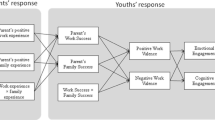Abstract
One of the most important lessons a young person may learn from working is how to interact effectively with others. This potential outcome of work experience has received virtually no attention from proponents of the early integration of adolescents into the workplace. In this paper we suggest that working may contribute to the development of more advanced social understanding (i.e., social sensitivity, social insight, and effective social communication and manipulation) by requiring youngsters to (a) shift back and forth between diverse roles and (b) interact frequently with strangers. Illustrative material is presented from interviews with 100 working adolescents and their parents.
Similar content being viewed by others
References
Bronfenbrenner, U. (1979).The Ecology of Human Development Harvard University Press, Cambridge, Mass.
Greenberger, E., and Steinberg, L. (1980). Part-time employment of in-school youths: A preliminary assessment of costs and benefits. InA Review of Youth Employment Problems, Programs, and Policies, Vol. 1:The Employment Problem: Causes and Dimensions, The Vice-President's Task Force on Youth Employment, U.S. Department of Labor, Washington, D.C.
Greenberger, E., Steinberg, L., and Ruggiero, M. (in press). A job is a job is a job ... or is it? Behavioral observations in the adolescent workplace.Sociology of Work and Occupations.
Greenberger, E., Steinberg, L., Vaux, A., and McAuliffe, S. (1980b). Adolescents who work: Effects of part-time employment on family and peer relations.J. Youth Adoles. 9: 189–202.
Greenspan, S. (1979). Social intelligence in the retarded. In Ellis, N. R. (ed.),Handbook of Mental Deficiency: Theory and Research 2nd ed., Erlbaum, Hillsdale, N.Y.
Hill, J., and Palmquist, W. (1978). Social cognition and social relations in early adolescence.Int. J. Behav. Dev. 1: 1–36.
Inhelder, B., and Piaget, J. (1958).The Growth of Logical Thinking from Childhood to Adolescence Basic Books, New York.
Kohlberg, L., and Gilligan, C. (1972). The adolescent as philosopher. In Kagan, J., and Coles, R. (eds.),Twelve to Sixteen: Early Adolescence Norton, New York.
Neimark, E. (1975). Intellectual development in adolescence. In Horowitz, F. (ed.),Review of Child Development Research, Vol. IV, University of Chicago Press, Chicago.
Scharff, D. (1975). The transition from school to work: Groups in London high schools. In Berkovitz, I. (ed.),When Schools Care Brunner/Mazel, New York.
Scharff, D., and Hill, J. (1976).Between Two Worlds: Aspects of the Transition from School to Work Careers Consultants, London.
Shantz, C. (1975). The development of social cognition. In Hetherington, E. (ed.),Review of Child Development Research, Vol. V, University of Chicago Press, Chicago.
Steinberg, L. (in press). Whither the workplace? The problems and promises of work experience for adolescents. In Simon, J., and Stipek, D. (eds.),Exit Age: Reconsidering Compulsory Education for Adolescents. Studies in Social Science, Education, and Law, Academic Press, New York.
Steinberg, L., and Greenberger, E. (1980). The part-time employment of high school students: A research agenda.Children and Youth Services Rev. 2: 161–185.
Westcott, D. (1976). Youth in the labor force: An area study.Monthly Labor Rev. July, pp. 3–8.
Author information
Authors and Affiliations
Additional information
This study is part of a large-scale investigation of the costs and benefits of part-time employment during the high school years. The first two authors are Co-Principal Investigators of the Spencer Foundation grant and share primary and equal responsibility for this report.
Received Ph.D. in human development and family studies from Cornell University. Main research interests are adolescent development, life-span development, and social policy.
Received Ph.D. in clinical psychology from Harvard University. Main research interests are adolescence and social institutions, life-span development, and social policy.
Main research interests are environmental and community psychology.
Main research interests are human development and social policy.
Rights and permissions
About this article
Cite this article
Steinberg, L.D., Greenberger, E., Jacobi, M. et al. Early work experience: A partial antidote for adolescent egocentrism. J Youth Adolescence 10, 141–157 (1981). https://doi.org/10.1007/BF02091741
Received:
Issue Date:
DOI: https://doi.org/10.1007/BF02091741




